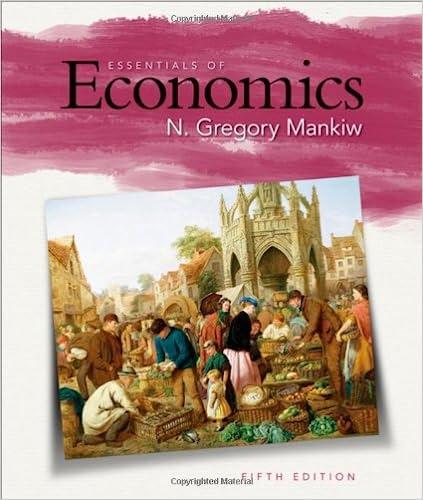Question
1 Introduction Decision-makers in government rely on the advice of experts when formulating policy or discharging their statutory responsibilities. In the assignment you will take
1 Introduction
Decision-makers in government rely on the advice of experts when formulating policy or discharging their statutory responsibilities. In the assignment you will take the role of an expert economist, employed by a government department. An expert economist's role in the government decision-making process is two-fold:
- Analysis: Economists use their specialist knowledge and skills to analyse the likely outcomes of policy alternatives. They then evaluate these outcomes against the government's objectives and statutory obligations.
- Communication: Economists communicate their findings to ministers and senior public servants, who, in many instances, do not share their specialised knowledge.
- This assignment will assess your aptitudes in both of these domains. You are to conduct an industry analysis based on the scenario detailed in section 2. Then use your analysis as the basis for a brief (a short report) summarising your recommendations and the associated rationale.
1.2 Grading
There are a total of 100 marks available in this assignment (50 marks for the industry analysis and 50 marks for the brief), and the assignment contributes 40% of your grade for Price Theory. The marks allocated to each step of the industry analysis are detailed in section 3. The marking criteria for the brief can be found in the rubric.
1
2 Scenario
In the island nation of Autarka, the government holds a monopoly over the provision of airfreight services. Both the general public and business groups regularly complain about high prices and poor quality of service from the government owned monopoly, Autarka Airfreight Services (AAS).
In response to these complaints, the national government commissioned the competition authority to recommend steps for improving the efficiency of the airfreight market. The commission made two recommendations:
- The airfreight services market should be opened up to competition from privately owned firms.
- Each firm operating in the airfreight market, including AAS, should be required to pay an annual lump-sum licence fee to the government.
The competition authority expects that the reforms will lead to a lower cost, higher quality service. The national government of Autarka has pledged to implement all of the commission's regulations.
2.1 Industry structure
The airfreight market is best modelled as Cournot competition. This is because competing firms must hire aircraft and establish distribution networks before offering airfreight services. Demand for airfreight services is,
P =420.2Q,
where P represents the price of transporting a package, and Q is the total number of packages transported per year, measured in millions of packages.
At present, AAS charges $30 a package and transports 60,000,000 packages per year. While the firm is inefficient, it manages to return an operating profit of $180,000,000 per year into government revenues.
The competition authority expects that after implementing the market reforms, all firms in the market (including AAS) will be more efficient. Each firm in the market will be able to transport a package at a marginal cost of $6 per package, and face fixed costs of $100,000,000 per year.
2.2 Your task
The Minister for Transport has instructed you to recommend an appropriate licence fee for the airfreight market. The minister has three objectives:
1. Maximise government revenues from the licence fee;
2. Minimise the cost of airfreight services to consumers, and;
3. Increase the number of packages transported per year to at least 150,000,000.
Note that competition policy prevents the government from imposing any other form of market regulation, including price controls or quotas.
2
3 Industry analysis
For your Industry Analysis you must complete each of the steps detailed below. The required analysis draws on content covered in lectures 6-10 (primarily lecture 9). When completing the steps you must:
Write all equations using the 'Insert Equation' function (or equivalent).
Show all of your working.
Include sufficient written description for the reader to follow your process. Use appropriate notation and economic terminology.
Your audience for the industry analysis is other expert economists who may be required to review your work. There is no page limit for the Industry Analysis.
3.1 Required steps
When completing the industry analysis you should assume that firms are engaged in Cournot Competition.
Step 1: Using the information provided in the scenario, derive a total cost function for a typical firm. Use QA to indicate the number of packages transported by the firm (measured in millions of packages). (4 marks)
Step 2: Using the cost function from step 1, derive a profit function for the typical firm. Use X to represent the combined number of packages transported by all other firms (measured in millions of packages). (7 marks)
Step 3: Derive the typical firm's best-response function. (7 marks)
Step 4: Find the equilibrium quantity of the typical firm as a function of the total number of firms competing in the market. Use N to represent the total number of firms competing in the market. (6 marks)
Step 5: Find the equilibrium market quantity and market price as a function of N. (8 marks)
Step 6: Find the equilibrium producer surplus of the typical firm as a function of N. (8 marks)
Step 7: Do any additional calculations that you require to support your recommendation. (10 marks)
Step by Step Solution
There are 3 Steps involved in it
Step: 1

Get Instant Access to Expert-Tailored Solutions
See step-by-step solutions with expert insights and AI powered tools for academic success
Step: 2

Step: 3

Ace Your Homework with AI
Get the answers you need in no time with our AI-driven, step-by-step assistance
Get Started


